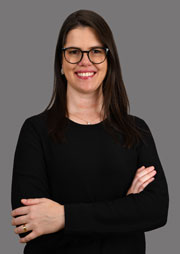Koerich receives grant from Alzheimer’s Association

Suélyn Koerich, PhD, postdoctoral research fellow in the Department of Neurology, has been awarded a 3-year, $200,000 grant from the Alzheimer’s Association to study the therapeutic effect of plasma exchange in amyloid beta pathology.
“I am honored to receive this award,” Koerich said. “I’m aware of the difficulties Latin-American scientists face regarding social and language barriers while developing science. This will allow me to develop my personal and academic skills and test my hypothesis with more independence.”
In her studies, Koerich investigated the possibility of using plasma exchange as a way to clear the circulation from toxic species, including amyloid beta oligomers. Previous studies of preclinical models with Alzheimer’s disease suggest that amyloid beta and tau aggregates can spread across different tissues showing the brain lesions typically observed in the disease.
“The role of blood and peripheral clearance in the spread of these structures has not been extensively explored,” Koerich said. “However, recent studies have shown that biologically active amyloid beta oligomeric seeds might be present in blood of Alzheimer’s disease patients and preclinical models, suggesting that this biological fluid may play an important role in the spreading of the disease.”
Koerich developed a technique for plasma exchange surgeries that access the jugular vein in Alzheimer’s disease pre-clinical models. Results of the study showed that development of cerebral amyloid plaques significantly reduced using the technique, suggesting that a target for therapy for Alzheimer’s disease could exist in the peripheral circulation opening up potential novel interventions.
“As a scientist, my goals have a clear purpose: To achieve a better understanding of the complex causes and mechanisms leading to Alzheimer’s disease and to identify novel targets for diagnostic use and therapeutic intervention,” Koerich said.
Koerich’s work also was part of a NIH/NIA R01 project, “Role of circulating amyloid beta seeds and peripheral tissue damage in Alzheimer’s disease pathogenesis,” which hopes to help uncover new strategies for early Alzheimer’s disease diagnosis and therapy. Koerich’s mentor is Claudio Soto, PhD, professor of neurology and director of the George and Cynthia W Mitchell Center for Alzheimer’s Disease and Other Brain Related Illnesses.